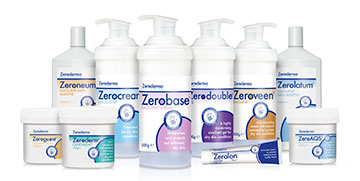COVID precautions and dry skin

Constant hand washing, using hand gels and wearing face coverings have all become part of everyday life, as we try and protect ourselves (and others) from COVID-19. But these essential precautions are all taking their toll on our skin, with more people than ever coming into pharmacies and GP practices asking for advice.
Check out Zeroderma’s handy COVID-19 skincare resources page!
Pre-COVID, some occupations such as health workers, hairdressers, cleaners and food handlers were already identified as at risk from dry skin conditions. Other risk factors include frequent hand washing, exposure to soaps and detergents and wearing occlusive gloves.1 Before the pandemic, the British Association of Dermatologists estimated that 1 in 20 people experienced hand eczema, a figure which is likely to have increased significantly over recent months.2
So if your skin feels dry, tight and itchy, particularly on your hands or face, what can you do?
The first step is additional skin moisturising, using an emollient (‘medical moisturiser’). Emollients are usually free from colour, perfume and irritating additives, which could make your skin feel worse. They contain fats and oils to increase the hydration of your skin. They come in a variety of consistencies ranging from ointments (thicker) to creams (thinner).
Emollients help reduce dryness, roughness and scaling, as well as improve symptoms, like itching and tightness. Aqueous cream BP should be avoided as it contains a known skin irritant called SLS.3 You may need to use two different ones, such as a rich ointment at night and a lighter cream during the day.
If you’re not sure which one will be best for your skin, ask your pharmacist for advice, we are always happy to help.
General skin care advice
- Always use a fragrance-free emollient after washing your hands or using a hand gel.
- Use a fragrance-free emollient on your face after wearing a face covering
- Apply the emollient with smooth downwards strokes, but don’t rub it in.
- Avoid wearing make-up under your mask, as it may block skin pores.
Advice for those who already have a dry skin condition
- Cleanse your hands and face with an emollient (using as a soap substitute) and avoid the use of all soaps and detergents on your skin.
- Continue using any prescribed skin treatment.
- If you have facial eczema that is made worse by wearing a face covering, the Government has exemption badges and cards on its website that you can print out.4
Note
References
- Jindal R, Pandhi D. Hand Hygiene Practices and Risk and Prevention of Hand Eczema during the COVID-19 Pandemic. Indian Dermatol Online J. 2020;11(4):540-543. Published 2020 Jul 13. doi:10.4103/idoj.IDOJ_448_20
- British Association of Dermatologists (BAD), Hand dermatitis / Hand eczema leaflet, 2019, http://www.bad.org.uk/leaflets
- Moncrieff, G. et al. (2013). Use of emollients in dry-skin conditions: consensus statement. Clinical and Experimental Dermatology. Vol 38(38), pp. 231–238
- National Eczema Society https://eczema.org/

